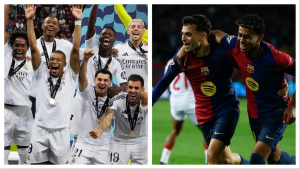
The fierce rivalry between Real Madrid and Barcelona, often referred to as “El Clásico,” transcends the realm of sports, embodying a clash of cultures, identities, and, in many ways, political ideologies. For decades, this match has captured the hearts and minds of millions, drawing fans from all corners of the globe. Beyond the tactical prowess and athleticism displayed on the pitch, this historic showdown also intersects with issues of human rights, social justice, and the broader implications of sporting events in society.
In this context, Xoilac TV has emerged as a significant platform for promoting human rights issues in football. By covering stories that resonate with fans and raising awareness about social justice, they contribute to the ongoing conversation around equality and inclusivity in the sport.
The Cultural Significance of El Clásico
A Clash of Identities
The rivalry between these two Spanish giants is deeply rooted in the country’s history. Real Madrid is often viewed as a symbol of Spanish nationalism, with a legacy intertwined with the centralist government, particularly during the Franco regime. On the other hand, Barcelona represents Catalonia’s identity and its push for autonomy, making the matches not just about football but a representation of political and cultural aspirations.
Throughout history, El Clásico has been a platform for expressing sentiments about Catalonian independence, social justice, and national pride. The socio-political atmosphere surrounding these matches amplifies their significance, transforming the encounters into a battleground for broader societal issues.
The Fans’ Role in Human Rights Advocacy
The passion of fans during El Clásico serves as a double-edged sword. While it unites people in their love for the game, it can also fuel aggression and violence. However, many fans and organizations have harnessed this energy to advocate for human rights. Through various initiatives, they have raised awareness about issues such as racial discrimination, gender equality, and workers’ rights.
For instance, supporters of both clubs have engaged in campaigns to promote inclusivity within football. These efforts aim to challenge the stigma associated with certain fan demographics, advocating for a more equitable environment in sports. Events like El Clásico provide a unique opportunity to channel fan enthusiasm into constructive dialogue about societal issues, demonstrating how football can act as a catalyst for change.
The Global Impact of El Clásico
A Platform for Social Change
The influence of El Clásico extends far beyond Spain. The matches draw millions of viewers worldwide, creating a platform to address global human rights issues. With each encounter, the spotlight is on not only the players but also the cultural narratives that shape their identities and experiences.
Many players from diverse backgrounds take the field, representing different nations and cultures. Their experiences often reflect broader societal issues, such as immigration, racism, and gender inequality. As these athletes showcase their talents on an international stage, they also serve as role models, advocating for change and inspiring future generations.
Collaboration with NGOs
In recent years, both clubs have collaborated with non-governmental organizations (NGOs) to promote social initiatives. For example, Barcelona’s “Barça Foundation” focuses on social inclusion, education, and health. Similarly, Real Madrid’s “Foundation” engages in various charitable activities, supporting vulnerable communities and advocating for human rights.
These initiatives underscore the responsibility that football clubs hold in fostering positive social change. By leveraging their popularity, they can bring attention to pressing human rights issues, encouraging fans and stakeholders to take action.
Human Rights Challenges in Football
A popular website for football fans in Vietnam. If you don’t want to miss any football game, this website Xôi lạc can be very helpful for you.
Racism and Discrimination
Despite the potential for positive impact, football, including El Clásico, grapples with persistent challenges related to racism and discrimination. Incidents of racial abuse directed at players are not uncommon, highlighting the need for systemic change within the sport.
Both clubs have taken a stand against racism, implementing campaigns to educate fans and promote inclusivity. However, the effectiveness of these initiatives relies on the collective commitment of players, fans, and governing bodies to address these issues comprehensively.
Gender Inequality
Another significant human rights concern in football is gender inequality. Women’s football has gained recognition, yet it continues to face challenges regarding visibility, funding, and opportunities. The disparity between men’s and women’s football is stark, with many female players fighting for fair treatment and recognition.
Both Real Madrid and Barcelona have made strides in promoting women’s football, investing in their women’s teams and advocating for equal pay. However, the journey towards gender equality in sports remains ongoing, requiring collective effort and advocacy from all stakeholders.
Worker Rights in Major Events
The organization of major football events, including El Clásico, often raises concerns about workers’ rights. Issues surrounding fair wages, working conditions, and the treatment of workers, especially in construction and event management, have garnered international attention.
As football clubs and organizations prepare for matches, they must prioritize ethical practices, ensuring that the rights of workers are respected and upheld. This responsibility extends beyond the pitch, emphasizing the need for accountability in all aspects of the sport.
The Role of Media in Human Rights Advocacy
Raising Awareness
Media coverage plays a crucial role in highlighting human rights issues associated with football. Journalists and broadcasters have the power to shine a light on injustices, advocating for change and accountability. Through their reporting, they can inform the public about the socio-political dynamics at play during El Clásico and other matches, fostering awareness and dialogue.
Promoting Positive Narratives
The media also has the opportunity to promote positive narratives surrounding football. By showcasing initiatives that prioritize human rights and social responsibility, they can inspire fans and stakeholders to engage in advocacy efforts. This shift in narrative can empower individuals and communities, reinforcing the idea that football is not merely a game but a platform for social change.
Conclusion
As we reflect on the significance of El Clásico beyond the pitch, it is essential to recognize the role that football can play in promoting human rights and social justice. The historic rivalry between Real Madrid and Barcelona serves as a reminder of the power of sport to unite and inspire, while also highlighting the challenges that persist within the game.
To effect meaningful change, we must continue to advocate for inclusivity, equality, and justice in football. Fans, players, clubs, and media organizations must unite in their efforts to address issues such as racism, gender inequality, and workers’ rights. Together, we can harness the passion and influence of football to create a more equitable and just world.
In this ongoing struggle for human rights, platforms like Xoilac TV play an instrumental role in fostering awareness and advocating for change. By engaging in conversations that challenge the status quo, we can ensure that the beautiful game continues to inspire positive social transformation for generations to come.


